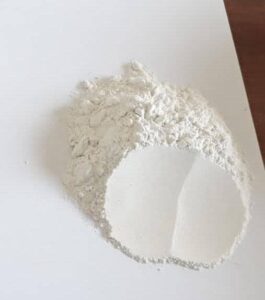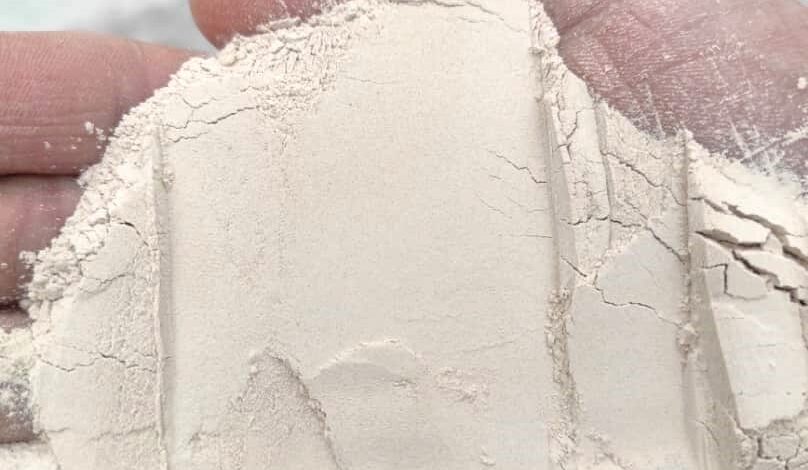Enhancing Quality and Efficiency in the Paper Industry
Bentonite, a natural clay, plays a critical role in the paper industry. It enhances the quality of paper products and improves the overall efficiency of production. Bentonite is known for its binding, stabilizing, and thickening properties, making it an essential ingredient in manufacturing paper. This article will explain how bentonite benefits paper production, improves paper quality, and reduces costs.

What is Bentonite?
Bentonite is primarily made of montmorillonite, a mineral that absorbs water and expands. Sodium bentonite is the type most used in paper production because it has excellent absorbent properties.
This clay is found in many regions of the world, including the U.S., China, and Europe. It is used in various paper manufacturing stages as a filler, binder, or coating agent to enhance paper quality.
The Role of Bentonite in Paper Manufacturing
Bentonite serves multiple purposes in paper production:
- Filler: It improves opacity and thickness.
- Binder: It strengthens the paper by holding fibers together.
- Coating Agent: It gives the paper a smooth and polished finish.
- Thickener: It maintains uniform consistency in the pulp.
Key Benefits of Bentonite in Paper Production
1. Stronger and More Durable Paper
Bentonite increases the strength of paper. It binds the fibers together more effectively, making the paper more durable. This is especially useful for packaging materials and cardboard, which need to withstand heavy-duty handling.
With bentonite, paper can endure greater stress without tearing or degrading. This makes it ideal for industrial applications where strength is crucial.
2. Improved Opacity and Thickness
Bentonite enhances the opacity and thickness of paper. This is especially important for printing paper, magazines, and catalogs. The added thickness gives paper a premium feel, while the improved opacity prevents text and images from showing through.
This benefit leads to better print quality, ensuring clearer, sharper results for high-quality printing projects.
3. Smoother Paper Surface
Bentonite gives paper a smooth and even finish. As a coating agent, it helps produce a polished surface that is perfect for high-end printing. The smoother surface improves ink adhesion, leading to more vibrant and precise prints.
This makes bentonite especially valuable for producing brochures, marketing materials, and high-quality print publications.
4. Cost-Effective Production
Bentonite is a cost-effective solution for paper manufacturers. It is widely available and relatively inexpensive, making it an affordable option for improving paper quality. By using bentonite as a filler or binder, manufacturers can reduce the need for more costly chemicals and additives.
Moreover, its ability to improve paper durability reduces waste, leading to more efficient production and lower costs over time.
Applications of Bentonite in Paper Production
Bentonite, a naturally occurring clay composed of montmorillonite, has become a valuable material in many industries, including the paper production sector. The unique properties of bentonite, such as its absorbent nature and binding abilities, make it an essential additive for improving the quality and efficiency of paper manufacturing. In this article, we will explore the applications of bentonite in paper production, including its role in filling, binding, coating, and thickening, among others.
What is Bentonite?
Bentonite is a clay mineral known for its swelling and absorbent properties, predominantly made of montmorillonite. There are two main types of bentonite: sodium bentonite and calcium bentonite, each with distinct characteristics and applications. Sodium bentonite is most commonly used in the paper industry due to its superior ability to absorb water and enhance paper quality.
In paper production, bentonite is utilized for a variety of purposes. It is added to pulp, coating mixtures, and paper formulations to improve paper properties such as strength, opacity, smoothness, and thickness. Bentonite contributes to the manufacturing process by acting as a filler, binder, and coating agent, among other functions.
Key Benefits of Bentonite in Paper Production
Before we dive into the specific applications, it’s important to highlight the key benefits of using bentonite in paper manufacturing:
- Strength and Durability: Bentonite acts as a binder, improving the structural integrity and durability of paper.
- Enhanced Opacity: By increasing opacity, bentonite ensures that paper products are more resistant to transparency and allow for better print quality.
- Smoothness and Surface Finish: The coating properties of bentonite help produce a smooth, polished finish that is essential for high-quality printed materials.
- Cost Efficiency: Bentonite is an affordable, abundant material that can reduce production costs while improving paper quality.
With these benefits in mind, let’s explore the various applications of bentonite in the paper production process.
Applications of Bentonite in Paper Production
1. Bentonite as a Filler in Paper Manufacturing
One of the most common applications of bentonite in paper production is as a filler. Fillers are added to paper pulp to improve its opacity, thickness, and texture. Bentonitic clays like sodium bentonite are effective at enhancing paper’s ability to block light transmission, creating a more substantial paper product.
-
Improved Opacity: Paper products with added bentonite are less transparent, which is particularly important for materials such as printing paper, magazines, and catalogs. The increased opacity ensures that ink does not show through, providing a better quality print.
-
Increased Thickness: Bentonitic clays contribute to the overall thickness of paper, making it feel more substantial without sacrificing print quality. This is essential for high-end packaging and premium printing products where thickness is a key feature.
Bentonite fillers also help reduce the amount of expensive raw materials needed in the paper manufacturing process. By replacing part of the cellulose fibers with inexpensive bentonite, manufacturers can cut costs while maintaining the desired quality.
2. Bentonite as a Binder in Paper Production
Another significant application of bentonite in paper production is its role as a binder. Binders are essential for holding the fibers together, ensuring the final paper product remains durable and intact.
-
Improved Paper Strength: Bentonite helps bind paper fibers more effectively, improving paper strength and durability. This is especially beneficial for applications such as cardboard and packaging materials, where strength is critical for withstanding physical stress during transport.
-
Enhanced Durability: The binding properties of bentonite help prevent paper tears and improve its ability to endure rough handling. This makes bentonite particularly useful in producing industrial papers and packing materials that require high tensile strength.
By strengthening the fibers, bentonite also reduces the likelihood of paper breaking or deteriorating during use, contributing to longer-lasting products.
3. Bentonite in Paper Coatings
Bentonite is widely used as an important component in paper coatings, where its ability to improve smoothness and finish is highly valued. When added to coating formulations, bentonite provides a uniform, smooth surface that is perfect for high-quality printing applications.
-
Improved Surface Finish: Coated papers, such as those used in brochures, magazines, and advertising materials, benefit from bentonite’s ability to create a polished finish. A smoother surface helps ensure that ink adheres properly, resulting in sharper images, clearer text, and more vivid colors.
-
Better Ink Retention: The coating properties of bentonite also help retain ink more effectively, reducing the risk of ink smudging and ensuring that printed materials maintain their quality throughout their lifecycle.
Bentonite coatings are especially beneficial for high-end printing jobs where print quality and finish are crucial.
4. Bentonite as a Thickening Agent in Paper Production
In some stages of paper production, bentonite is used as a thickening agent. It helps increase the viscosity of the pulp, ensuring that it maintains a uniform consistency throughout the manufacturing process. This is particularly important in the formation of paper sheets.
-
Uniform Paper Consistency: By controlling the thickness of the pulp, bentonite ensures that the paper-making process remains efficient and consistent. This results in uniform paper sheets with fewer defects.
-
Improved Paper Texture: Bentonite can also help improve the texture of the final paper product, making it feel smoother and more refined. This is valuable for paper used in high-end packaging, stationery, and consumer products.
The thickening effect of bentonite also contributes to more efficient manufacturing processes, reducing waste and improving overall production efficiency.
5. Bentonite in Tissue Paper and Towels
Bentonite is used in the production of tissue papers and paper towels to enhance their absorbency and strength. Tissue products need to be both soft and durable, and bentonite helps achieve this delicate balance.
-
Enhanced Absorbency: The absorbent properties of bentonite help tissue products like napkins and paper towels perform well in everyday use. They absorb moisture more effectively, ensuring better functionality.
-
Strength and Softness: Bentonite improves the structural integrity of tissue paper while maintaining its softness. This is essential for consumer products that demand both comfort and durability.
Tissue manufacturers appreciate bentonite for its ability to improve both performance and product longevity.
Why Bentonite is Essential for Paper Manufacturers
Bentonite offers paper manufacturers a range of benefits, including:
-
Cost-Effective: Bentonite is an affordable material that can reduce production costs without compromising the quality of the paper. It is an economical alternative to other expensive chemicals used in paper production.
-
Sustainable: As a natural, abundant material, bentonite contributes to more eco-friendly paper manufacturing processes. Its use helps reduce the reliance on synthetic additives, which may be harmful to the environment.
-
Versatile: Bentonite’s ability to function as a filler, binder, coating agent, and thickening agent makes it a highly versatile material. It can be tailored to suit various paper production needs, making it a valuable asset across multiple paper industries.
-
Improved Paper Quality: From enhancing strength and smoothness to boosting opacity and absorbency, bentonite ensures high-quality paper products that meet the demands of both consumers and businesses.
Why Choose Bentonite for Paper Production?
1. Sustainability
Bentonite is a natural material, making it a more sustainable option compared to synthetic additives. It is abundant and eco-friendly, which makes it a responsible choice for manufacturers seeking to reduce their environmental impact.
Its use in paper production promotes more eco-conscious manufacturing processes.
2. Versatility
Bentonite is highly versatile and can be used in different stages of paper production. Whether as a filler, binder, or coating agent, it can be customized to meet specific production needs. This versatility makes bentonite essential for producing a wide range of paper products.
Its adaptability allows manufacturers to achieve various desired characteristics in the final paper product.
3. High-Quality Results
Bentonite consistently improves paper quality. It enhances strength, smoothness, and opacity, ensuring the paper meets the highest standards. Whether used in printing, packaging, or tissue production, it helps create durable and high-performance paper products.
Manufacturers can rely on bentonite to deliver superior quality products every time.
Conclusion
Bentonite offers numerous benefits in paper production. From improving strength and opacity to enhancing surface smoothness and cost-effectiveness, bentonite is essential for producing high-quality paper products.
Its natural properties make it a sustainable and versatile solution for the paper industry. Manufacturers can rely on bentonite to enhance paper quality while reducing production costs. As demand for sustainable materials grows, bentonite remains a valuable choice for paper manufacturers.

